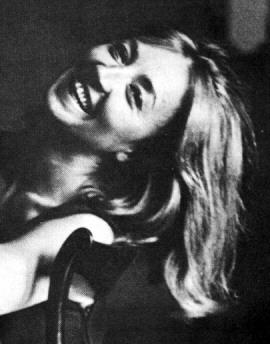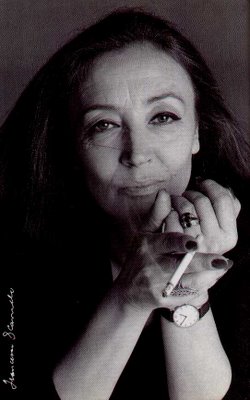
Who was Oriana Fallaci?
October 15, 2006
Author’s note: I finally had a chance to clean-up earlier “versions” and re-write the piece with no word limitations…
For my earlier posts about Ms. Fallaci, please see: “20060915 Italian lioness of letters Oriana Fallaci had died;” “20060917 Oriana Fallaci buried today Sun Sept 17 2006;” “20061003 Who was Oriana Fallaci?;” and here in The Tentacle: “Oriana Fallaci, a refreshing approach.”
_____
October 15, 2006 by Kevin Dayhoff (1370 words)
On September 15, Oriana Fallaci, the Italian lioness of letters, died of cancer.
Although Ms. Fallaci was one of the world’s greatest artists of letters; she is today, relatively unknown in the United States.
A prolific – quite controversial - journalist and existential writer with an aggressive and indefatigable approach to life, she had been shot several times and left for dead, had torrid affairs and put on trial.
She never skipped a beat.
Born in Italy on June 29, 1929 Ms. Fallaci served in the fascist resistance during World War II. She began her journalistic career in 1950 as a teenager and went on to be a war correspondent in Vietnam, the Middle East, South America and the Indo-Pakistani Wars.
According to published accounts, “During the 1968 Tlatelolco massacre prior to the 1968 Summer Olympics, Fallaci was shot three times, dragged down stairs by her hair, and left for dead by Mexican armed forces.”
She continued her career by interviewing many of the world leaders of our time and consistently took no prisoners. Her journalistic style is the stuff of mythology and legend.
Ms. Fallaci would often wax philosophical about existentialism and then abruptly switch to calmly delivered, aggressive questioning that disarmed the greatest men of words. The many world leaders she interviewed included Henry Kissinger, the Shah of Iran, Ayatollah Khomeini, Lech Wałęsa, Willy Brandt, Walter Cronkite, Omar Khadafi, Yasir Arafat, Indira Gandhi, Golda Meir, and Sean Connery.
In later years she penned a series of books and articles in which she was critical of the Muslim religion and culture.
It was only by a cruel coincidence that she passed away three days after Pope Benedict XVI, in a speech on Sept. 12, at the University of Regensburg in Germany, recited the words of Byzantine emperor Manuel II Paleologus; which reflect a view that the religion of Islam is spread by the sword.
Militant and extremist Muslims throughout the Middle East objected to that characterization by violently demonstrating, burning churches and killing innocent folks.
Hmmm. Okay, moving on,
Ms. Fallaci, an existentialist and an atheist publicly stated on August 27, 2005, her respect and admiration of Pope Benedict, specifically citing his 2004 essay entitled "If Europe Hates Itself,” after she met with the Pope in a private audience.
“Fallaci, who made her name interviewing statesmen (and not a few tyrants), believes that ours is "an age without leaders. We stopped having leaders at the end of the 20th century".”(Varadarajan, Telegraph, Apr. 9, 2005)
Ms. Fallaci, the subject of radical Islamists’ death threats, was diagnosed with cancer several years ago.
She was living in New York; in part, to avoid prosecution in her native Italy “under provisions of the Italian penal code for "vilipendio", or "vilification", of "any religion admitted by the state,” according to an article by Tunku Varadarajan in the Telegraph in Great Britain on April 9, 2005. (She quietly returned to Italy just days before her death, so that she could die in her native country.)
"When I was given the news, I laughed," Fallaci says of her indictment.
"Bitterly, of course, but I laughed. No amusement, no surprise, because the trial is nothing else but a demonstration that everything I've written is true." (Varadarajan, Telegraph, Apr. 9, 2005)
The article had the long descriptive title: “The moment you give up your principles, and your values, you are dead, your culture is dead, your civilization is dead. Period.”
When Tunku Varadarajan interviewed Ms. Fallaci for the Telegraph article, shortly after an Italian judge had indicted her, she was in “her mid-seventies and stricken with a cancer that, for the moment, permits only the consumption of liquids - so yes, we drank champagne in the course of a three-hour interview.”
“She pauses to light a slim black cigarillo and take a sip of champagne…
She professes to "cry, sometimes, because I'm not 20 years younger, and I'm not healthy. But if I were, I would even sacrifice my writing to enter politics somehow." (Varadarajan, Telegraph, Apr. 9, 2005)
(This writer certainly understands “I would even sacrifice my writing to enter politics somehow.")
To add some punctuation to his article, Tunka Varadarajan then emphasized: "Civilizations die from suicide, not by murder," the historian Arnold Toynbee wrote, and these words could certainly be Fallaci's. She is in a black gloom about Europe and its future: "The increased presence of Muslims in Italy, and in Europe, is directly proportional to our loss of freedom."
Tunka Varadarajan elaborated:
There is about her a touch of Oswald Spengler, the German philosopher and prophet of decline, as well as a flavour of Samuel Huntington and his clash of civilisations. But above all there is pessimism, pure and unashamed. When I ask what "solution" there might be to prevent the European collapse of which she speaks, she flares up like a lit match.
"How do you dare to ask me for a solution? It's like asking Seneca for a solution. You remember what he did?" She then gestures at slashing her wrists. "He committed suicide!" Seneca was accused of being involved in a plot to murder the emperor Nero. Without a trial, he was ordered by Nero to kill himself. One senses that Fallaci sees in Islam the shadow of Nero.
"What could Seneca do?" she asks, with a discernible shudder. "He knew it would end that way - with the fall of the Roman Empire. But he could do nothing."
The cause of her most recent problems surfaced in a book that she wrote in 2004, called: “The Force of Reason,” which has reportedly sold over a million copies worldwide.
Part of the problem is a particularly indelicate passage in which she said, Muslims "multiply like rats" and said "the children of Allah spend their time with their bottoms in the air, praying five times a day;" according to an Associated Press article written by Alessandra Rizzo and published the day she passed away.
This just threw salt in a wounded relationship Ms. Fallaci had maintained since she published another best-seller, days after the terrorist attacks on Sept. 11, 2001: “The Rage and the Pride.” This book also drew condemnation by the militant Muslim world.
There was an unsuccessful effort in France in 2003, to ban the book. This effort in France came on the heels of a Swiss arrest warrant for Ms. Fallaci when Italy was asked to either extradite her or put her on trial themselves.
Part of what annoyed folks in Switzerland and France was Ms. Fallaci referring to Europe in “The Rage and the Pride,” as “Eurabia.” She describes latest wave of suicidal appeasement and pacifism sweeping “Eurabia” and calls it a continent that has collectively “sold itself and sells itself to the enemy like a prostitute… "Europe becomes more and more a province of Islam, a colony of Islam…”
Tunka Varadarajan quotes Ms. Fallaci: “You cannot survive if you do not know the past. We know why all the other civilizations have collapsed - from an excess of welfare, of richness, and from lack of morality, of spirituality.”
As much as I’m not sure that I agree with Ms. Fallaci’s strident views on the Muslim religion, or that the Pope’s remarks were productive towards a meaningful dialogue with the Muslim world community; the approach of the late Ms. Fallaci and the Pope towards the extremists and terrorists is never-the-less thought provoking - - a hallmark of Ms. Fallaci’s brilliant work, whether one agrees with her or disagrees. (This writer takes no position on her politics. I respect her First Amendment rights and admire her “genius;” her “life of letters” and her joie de vie.)
It is only an existential, if not quixotic, perversion of reality that a child of the persecution of World War II, for which she became a legendary member of the resistance, a veteran war correspondent who often wrote from first-hand knowledge in the combat theatre – and a celebrated woman of letters and words in her seventies and stricken with cancer is persecuted for uttering words, while the world’s community of pandering appeasers apologize for extremist folks who want to kill women and children and you.
Oriana Fallaci will be greatly missed on the world stage.
Kevin Dayhoff writes from Westminster Maryland USA.
E-mail him at: kdayhoff@carr.org
####























